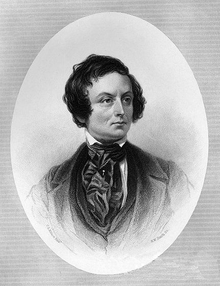Epes Sargent (poet)
| Epes Sargent | |
|---|---|
 |
|
|
|
|
| Signature | |
Epes Sargent (September 27, 1813– December 30, 1880) was an American editor, poet and playwright.
Epes Sargent was the son of Epes Sargent (1784–1853) and Hannah Dane Coffin (1787–1819), and was born in Gloucester, Massachusetts, on September 27, 1813, where his father was a ship master. In 1818 the family moved to Roxbury, Massachusetts. From 1823 to 1829 he attended the Boston Latin School, but his education was put on hold while he traveled for six months to Saint Petersburg, Russia with his father. Upon his return he helped start the school's first literary journal, where he wrote about his travels to Russia. He then attended Harvard University where he contributed to the Harvard Collegian, a college literary journal which was started by his older brother, John Osborn Sargent (1811–1891), who became a successful politician and journalist.
By 1831 he was working as an editor for the Boston Daily Advertiser. He then went to work editing the Boston Daily Atlas where he also served as its Washington D.C. correspondent. While reporting political affairs he became friends with Henry Clay, Daniel Webster and John C. Calhoun. During this time he also collaborated with Samuel Griswold Goodrich, writing the Peter Parley books, which embellished the biographies of our founding fathers with "fancy and legend".
Sargent's first play, The Bride of Genoa, premiered at Boston's Tremont Theatre on February 13, 1837, with a lead role written for American actress Josephine Clifton. Set in Genoa in 1593, the play was based on the historical Antonio Montaldo, a commoner who falls in love with the daughter of a nobleman named Laura Catelli, a role given to Charlotte Cushman when it played at the Park Theater in New York in November. In 1837, he wrote the tragedy Velasco for British actress Ellen Tree. It was produced in several theaters in the United States and had moderate success in London. Velasco was critically admired by playwright Thomas Talfourd and Edgar Allan Poe, who wrote "compared with American tragedies generally, is a good tragedy — indeed, an excellent one, but, positively considered, its merits are very inconsiderable". Around this time, Sargent wrote the words to the song, "A Life on the Ocean Wave".
...
Wikipedia
